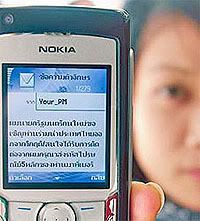 Mobile technology has infiltrated into our modern life so deep that without realizing it, mobile phone has become a must have gadget for every person; one phone for one person to say the least.
Mobile technology has infiltrated into our modern life so deep that without realizing it, mobile phone has become a must have gadget for every person; one phone for one person to say the least.
The once expensive mobile gadget to had, is now so cheap even a pedicab can own one. And people usually bring along their mobile phones wherever they go, anytime anywhere. And when talking rate time is costly, text message (SMS) becomes a way out to talk to others in cheap.
Knowing this global trend, the newly elected Thai Prime Minister (PM) sent mass text messages to a large portion of the nation’s mobile phone users. The message is a call out to help the PM to restore the country's political crisis.
Abhisit Vejjajiva was elected the Prime Minster of Thailand on December 15, 2008 and was formally endorsed by the Thai King on December 17, 2008.
The text message didn't cost a dime, but when the recipients reply to answer the asked postal code it'll cost them 3 Baht (US$0.10). After a user sends the postal code, he or she receives a message saying, "I am Abhisit Vejjajiva. Thank you very much, and I will get back to you."
The spam of text messages soon draws criticism, Foundation secretary-general Saree Aongsomwang said messages sent to mobile phone users without their consent could be seen as an invasion of their privacy. Later, deputy Democrat leader Korn Chatikavanij apologised to people who might find the message a nuisance.
Personally, I don't exactly commend nor condemn the use of text message this way. But since mobile phone has become a common technology in daily usage nowadays, this is the fastest way to get in touch with mass of people at the same time altogether. Text message can also be very useful to alert people to avoid natural disasters, like Tsunami alert in Indonesia.
Although we have to keep in mind, that text message is a pre-installed feature in every mobile phones sold around the world, so unlike Twitter client app which is also very useful to alert people in similar way, the goverment must limit the text messages sent to shun away invasion of privacy issue.
Sources are from Bangkok Post, via Tom's Guide.

No comments:
Post a Comment